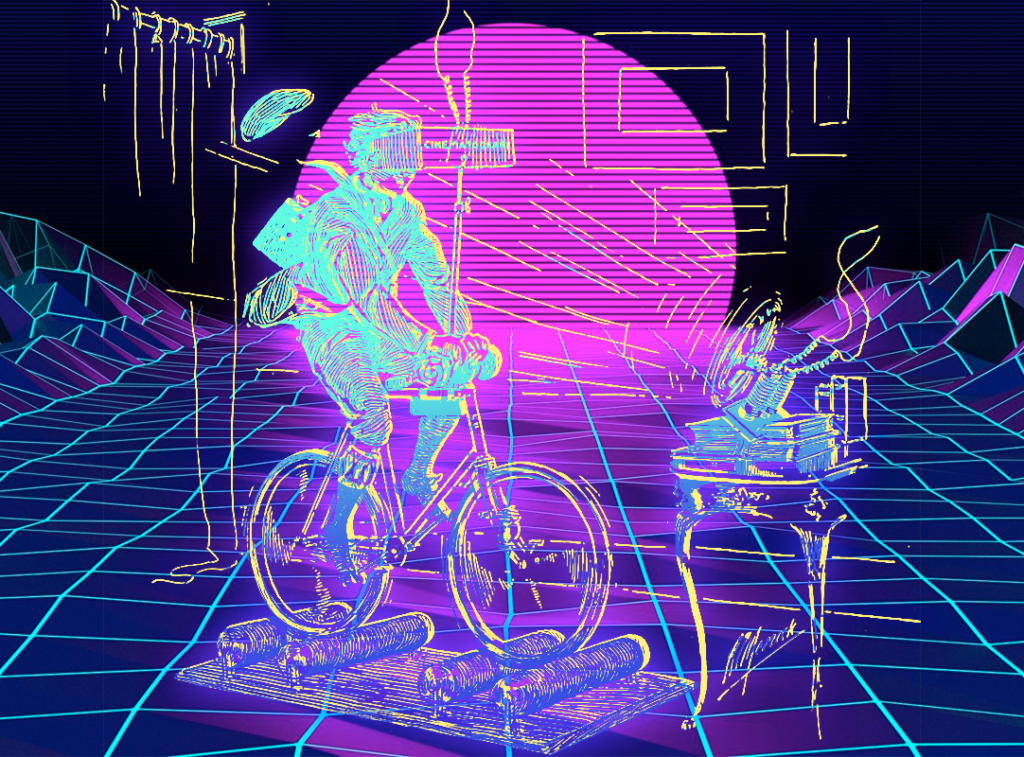
Henri Giroud has been in the sport for a long time. For better or worse, he’s made many predictions along the way. Most were short-term, such as picking a pre-race favorite on a live broadcast… but some were much longer-term. Written in 1986, here’s how he envisioned 2021 as he looked to the possible landscape of cycling 35 years in the future.
Virtual Racing
By the year 2021, it will be possible to race entirely virtually from your gym, or even your home. Magnetic rollers will simulate resistance to make it feel as though you’re riding uphill, downhill, or even into a crosswind. Exquisite virtual realties will transport you to new worlds in space or beneath the seas. Internet connectivity will allow you to compete against other cyclists from all over the globe, all in one virtual location.
This will be a sophisticated, high brow way to enjoy the sport. Only the most affluent cyclists will afford the technology and its ongoing costs, but the benefit to their club rides, races, and elegant networking through intelligent virtual in-ride discussion, will ensure they see incredible value.
Pro racing will also migrate to these virtual worlds. With no travel or support car requirements, the sport will open its doors to smaller teams and wonderful new racing opportunities. And don’t worry: because the computer controls everything, there’s no way to cheat.
The Greatest Hour
New technological innovations elevate the greatest contest of all: the Hour Record. It’s a natural site for bicycle manufacturers to demonstrate their ongoing pursuit of technological improvement, and of course for cyclists to demonstrate their own ongoing pursuit of pushing the limits of human capability. As such, it will soon become elevated as the sport’s greatest and most prestigious competition.
While virtual realities will allow anybody to unofficially attempt the record, this is one competition that will remain firmly in the real world due to bicycle manufacturer pressure.
Expect the 55km mark to fall quickly, followed by 60km. By 2021, the Hour Record will sit at over 80km. Attempts will be lavish affairs attracting huge amounts of publicity, and the record holders will be world famous.
A French Stranglehold on the Tour de France
Bernard Hinault is one of a kind. Or maybe not. Laurent Fignon has already won two Tours de France with a view to adding more in the future. France has conquered five Tours in a row at the time of writing, and there are no signs of this domination coming to an end.
The sport will explode in France, exciting new generations. Champions after champions will emerge. One can expect to see perhaps one or two non-French winners per decade.
This is not all good news. Fans and cyclists from the rest of the world will lose interest in France’s national race. The Hour Record will grow more popular as a global competition, while the sport will retreat otherwise into insular pockets. A Tour of America for the Americans. A Tour of Britain for the British. And so on. Only in virtual realities may these riders meet… but how will fans spectate there?
An End to Petroleum (And Leg Power)
By the 2020s, electric vehicles will cover all our transport needs. I do hear the traditional critiques of such vehicles, but one remains unconvinced. The idea that electric cars will just be a pile of flammable conflict minerals that constantly fall to pieces or drive themselves into things is simply unrealistic. No government would possibly allow such a thing. Instead, we’ll see self-driving cars driving on our highways and providing support at bike races. There will be no road rage and no accidents. Just clean, efficient transport.
But in cities? Electric bicycles will rule. Fast and elegant, they will be indistinguishable from the most high-end road bicycles, and weigh only a little more. With long battery lives and high speeds, transportation will become democratized, inexpensive, quiet, and pollution-free.
The pro peloton will also see its share of electric bicycles, whether they’re against the rules or not. That may be the next frontier for the prevention of cheating, making doping controls archaic relics of a past era.
Communist Success
The Cold War will endure, readers. The stand-off has no end in sight. The USSR, with its Soviets reaching into Eastern Europe is naturally better equipped than the USA to break into the sport.
They will take it seriously. We will see a Soviet Hour Record holder, a Soviet Tour victor, and high-profile stage races in all the various Soviet states.
Communist bicycle technology will also innovate, just as rapidly as its riders begin to conquer European cycling. And fear for the French: once the USA enters the bicycling arms race, its pace will pick up even more rapidly. The Soviets may well break the French stranglehold on the Tour in the 2020s, with an American victory coming shortly thereafter. And beyond, only athletes from these two countries might win for some time.

